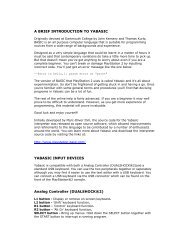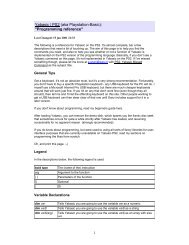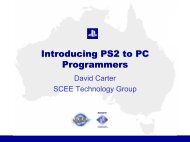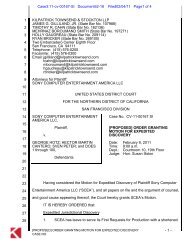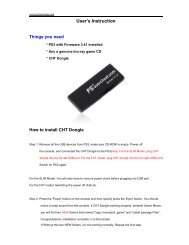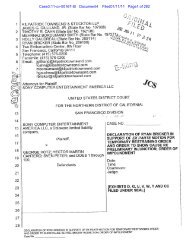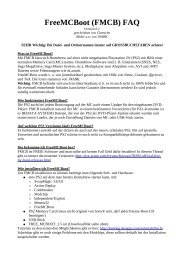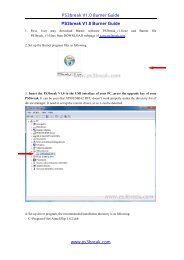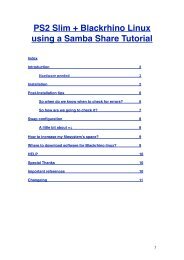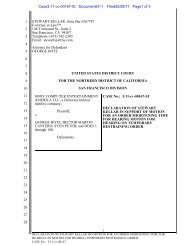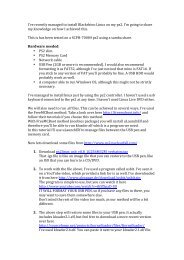You also want an ePaper? Increase the reach of your titles
YUMPU automatically turns print PDFs into web optimized ePapers that Google loves.
1/9/2011 Keys, keys, keys.<br />
needs to be protected from modification, and it can then sign the others). The rest are stored in two places:<br />
Hollywood SEEPROM: After meeting him at 24c3, bunnie was kind enough to decap some chips for me, including a Hollywood. One of those chips is<br />
2kbit serial EEPROM, which stores the MS signature on the the ECC key.<br />
One-Time Programmable Area: Inside the Starlet ARM core, there are a bunch of things:<br />
1. SHA1 hash of boot1<br />
2. Common key<br />
3. ECC private key<br />
4. NAND HMAC<br />
5. NAND AES key<br />
6. RNG seed<br />
7. other stuff we can’t yet decipher<br />
All of that info comes from tmbinc, who recovered it with a method he described here.<br />
Tags: Wii<br />
23 responses so far ↓<br />
1 Phredreeke // Apr 16, 2008 at 4:41 am<br />
Interesting read Keep up the good work<br />
2 Nobody // Apr 16, 2008 at 6:24 pm<br />
Bushing,<br />
Can you tie some of the official key names with those used in Trucha Signer?<br />
“boot1 key” = NAND key?<br />
“common key” = key.bin<br />
“sd key” = SD Key<br />
“sd iv” = ?<br />
“md5 blanker” = ?<br />
Case3:11-cv-00167-SI Document4 Filed01/11/11 Page49 of 282<br />
Ads by Google WII Points WII Play Mario Kart WII WIIDow nload WII Backups WII Emulator<br />
Excellent blog, by the way. It’s become one of my top reads.<br />
3 marcan // Apr 16, 2008 at 7:31 pm<br />
SD IV and MD5 Blanker are just arbitrary 16-byte constants stored inside the system menu. They aren’t “keys” per se and they aren’t sensitive.<br />
The boot1 key is separate from the NAND key. Common key is indeed key.bin.<br />
4 Dasda // Apr 17, 2008 at 12:29 pm<br />
The IV is just an XOR on the first 16 bytes of the decrypted file, to make them as they were before the encryption (I really don’t know why, I don’t think<br />
this is something related to security though).<br />
5 Odb718 // Apr 19, 2008 at 10:24 am<br />
Holy mother of keys! I had NO idea there were that many. This is worse then a janitor at a public school. I thought there’d be maybe 5 keys used.<br />
6 TD-Linux // Apr 19, 2008 at 12:20 pm<br />
Wow, a very nice explanation of the mess of a security system the Wii has! I especially liked your separation of the different kinds of keys (symmetric,<br />
asymmetric, etc). I’ll go see if this is on the wiki somewhere. If it isn’t, it’s very excellent information, and someone (possibly me) should port it over into<br />
mediawiki syntax.<br />
7 Newbie // Apr 19, 2008 at 3:57 pm<br />
Bushing,<br />
Can you clarify, what keys are unique for each console, please?<br />
Another (or same?) question,<br />
I tried to write a “Wii save games editor”, basically nothing more than a front end to Segher tools with some compare/edit capabilities.<br />
Based on your post, the only part I missed was ECC keys, right?<br />
hackmii.com/2008/04/keys-keys-keys/… 3/14



